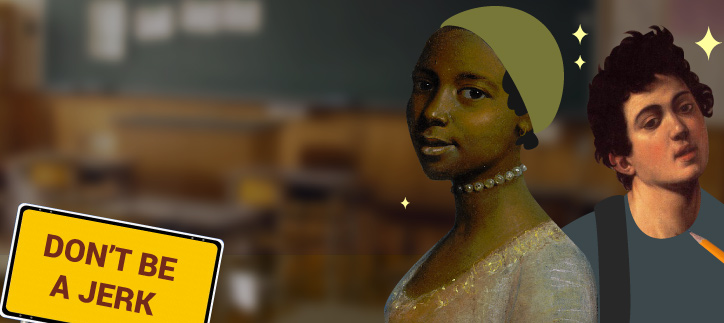
Teaching PBIS: Digital Citizenship
'Cause we are living in a digital world.
Looking for more PBIS resources? Check out all of our Teacher Guides and Online Courses here.
Let's face it: no matter how up-to-date we think we are with technology, talk to someone just a few years younger and they're bound to know way more than we do. Got a few hundred friends on Facebook? Your students probably have a thousand Instagram followers—each. Pretty good at responding to emails quickly? Your students are in constant communication with their friends and family, texting and emailing and WeChatting while they walk, talk, eat, and sleep. It's multitasking like you've never seen before.
So how do you keep up? By remembering that you have two secret weapons up your sleeves: the wisdom of experience, and Shmoop.
In this guide, you will find
- scripted lesson plans that cover everything from social media etiquette to crowd-sourcing.
- an activity that teaches students to appreciate their cushy, internet-dependent lives by having them hit the books for some old school library research. Read: no Googling allowed.
- an assignment about sleuthing out false information online—and how to avoid falling for it.
So brush up on your emojis and acronyms, and let's get cracking.
DAY 1: SHARING IS SCARY
Introduction
These days, teaching kids about social media is a bit like telling goldfish all about this amazing new thing called water—and not just because kids, like goldfish, tend to have short memories and are easily distracted by shiny things. While kids basically get what social media is for, they often don't quite grasp the bigger picture or the fact that, once something's posted online, it stays there, in one form or another, forever.
That's where you come in. Today, you're going to school your students in the pitfalls of posting personal information online.
Key Skills and Learning Objectives
- Social media: it's more dangerous than it looks.
- You can't delete anything from the internet.
- Seriously. Once it's on the internet, it's there forever.
Homework
- Yesterday: None. You're just starting.
- Today: Create a social media page or profile for something you enjoy.
VIRAL MEDIA
Materials Needed: Sticky notes, ridiculous photos from the internet, handout
Estimated Time to Complete: 50 minutes
The internet is forever. That's just another thing it has in common with diamonds, tattoos, and Beyoncé.
If there's only one thing you remember from today's lesson, make it this: the internet is forever. That means that literally any piece of information you put online can be released into the world at large, and it can float around in cyberspace for the rest of eternity. Pictures of your cat, blog posts, tweets, Facebook status updates about how totally awesome you used to think Justin Bieber was: every single one of these things has the potential to be seen by, well, everybody—not just the friends you intended it for when you wrote it, but your parents, your Great-Aunt Helga, your future husband or wife, even your potential employers several years from now. Once you put something online, it's there forever. And you know what Prince said: forever is "a mighty long time."
Today, we're going to do a little activity to illustrate how easily information can spread.
[Pass out one pad of sticky notes to each student. They can be pretty small.]
Here's how this is going to work. Each of you has a pad of sticky notes. These notes represent information about you: maybe an embarrassing picture of you at a party, maybe a blog post about that guy in your math class who looks like Nick Jonas, maybe your phone number. Write your initials on the first page of your notepad and pass that note to a neighbor.
Now, I want you to create another note. You can either write your initials on a fresh sticky note, or you can copy the initials you just got from a neighbor onto a new sticky note. Whatever you choose, take that second note, and pass it to another classmate. It can be the same person as last time, or you can give it to a new person. You can get up and move around if you want.
[Repeat this process. Each "round," students can either write their initials on a sticky note and pass it along, or they can copy one of the notes they've been given and pass it along. Play enough rounds so that there are sticky notes all over the room. Every person should have a collection stuck to their desk. After several rounds, you might introduce a third option where, instead of writing a new note, students can recover one shared note from anyone in the room—or you might not.]
As you can see, information moves, and multiplies, pretty quickly—and that's just with paper around a classroom. It gets a lot worse when you realize the internet is populated by everyone on the planet. Sure, that's a bunch of pretty great people, but there are also a lot of pretty terrible people, and it's really hard to figure out who's who and how to keep the bad ones out of your business once you put it online.
Now, it's time for Part 2: job hunting. Let's have a little demonstration.
[You're going to do some roleplaying here. Pick a student. Then have that student pick any other student in the class for a "job interview." You can also just pick two students yourself if that's a better fit for your class' dynamic. Allow the students to remain in their seats.
Explain that the first student is the interviewer, and the second student is the potential employee. Then ask to see the interviewer's sticky notes. If the interviewer has a sticky note with the potential employee's initials on it, implying some kind of unsavory online post, the potential employee doesn't get the job. Additionally, if the interviewer is sitting adjacent to anyone with a sticky note with the potential employee's initials on it, the interviewee doesn't get the job.
Repeat this roleplaying scenario one or two more times, if you'd like, until you feel you've proven your point.]
What you post online today can come back to haunt you tomorrow, next month, or even years down the line when you're up for your dream job. That hilarious picture of you acting like a goof at a party might crack your friends up, but it might also turn off your employer. Your employer may not have access to your Facebook photos, for example, but their friends have friends, and so do yours. Simply put, you never know who knows whom. The beauty of social media is that it connects us. The scary thing about social media is that it connects us with more people than we can control.
The important thing to remember here is that posting a photo on Twitter or writing an angry status update about your boss at the pickle shack doesn't make you a bad person. That's the whole point. You're not a bad person because you take goofy photos and get a little hot under the collar from time to time, but because of what you share on social media, people can assume the worst about you based on one single moment in time. Sure, they're not getting the whole picture, but frankly, they're not going to look for it. That's why it's so important to put the right foot forward.
[Divide the class up into groups of five students each. They can ditch the sticky notes at this point. Distribute the handout.]
Let's practice putting the best foot forward—not our feet, though; feet from pop culture. Here's what you and your group members are going to do. You're going to pick a character from a work of fiction—a movie, a book, a TV show, a web comic, whatever—and pick an event they were involved in. Then you're going to create a bad, or not-so-smart, social media post about it. After that, you'll create a better, or wiser, social media post about it.
For example, maybe you decide to use Superman from Man of Steel as an example. That's your character. Your event is where Supes fights General Zod and destroys half of Metropolis in the process. Sure, he triumphed over evil, but the dude accidentally injured and killed a lot of innocent people in those crumbling buildings.
A bad post might be something like "Kicked General Zod's sorry butt all over Metropolis today. You're welcome, Metropolis." A better post might be something like, "My sincerest condolences to those affected by the tragic events in Metropolis. I can assure you that General Zod will never bother us again."
The first post is bad because it ignores all of the destruction and loss of life that Superman caused, even if he ultimately was ridding the city of evil. Also, it's cocky. The second post is better because it acknowledges the pain that was caused as a side effect of saving the city.
Obviously, the real Superman probably wouldn’t write something as cocky as "You're welcome, Metropolis," just like one of the doctors on Grey's Anatomy wouldn't post a video of an awesome surgery that they did on YouTube, but that's the point. You and your group need to create five examples of bad social media behavior, and then revise them to make them shining examples of good social media behavior.
[Give students time to work, then ask for volunteers to share an example. The goal here is to show the students that even characters who are so good as to be fictional paragons could be screwed by posting the wrong thing online.]
[For today's final activity, you're going to need a collection of totally innocuous but slightly odd photos from the internet. You can get these with simple Google image searches (but, needless to say, everything should be SFW). You can either print out copies for students or round them up in a collage and project them.]
Lastly, you’re going to look at some of the odder potential consequences of information sharing. I have a stack of photos here that I pulled from the internet.
[Show students a couple of the photos.]
Who are these people? I have no idea, but you or I or literally anybody can nab these pictures of them off the web.
With your group, I'd like you to choose one photo and then write a short skit that explains how the photo happened. What's the photo's backstory? Your skit should be at least two manuscript pages, or pages of dialogue, long. Be creative, have fun, and when we're all done, we'll have a little performance.
[After students are done writing their skits, have each group show off their photo and then perform their skit to rapturous applause.]
HOMEWORK
Create a social media page or profile for a hobby or something you enjoy. This might be a Facebook group, a Tumblr page, a Twitter or Instagram account, or a subreddit, for example. Your goal is to create the beginnings of an online community for people with similar interests as you.
Make the mission of your page or account clear. For example, if you're going to create an Instagram account devoted to your love of animals dressed as humans, make that clear in your bio. If you're going to start a Facebook group for fans of the band Wolf Parade, fill out your page's info in sufficient detail and think about how you'd attract members to your community.
DISCUSSION AND ESSAY QUESTIONS
- How would you describe your social media presence? How many accounts, pages, and profiles do you have? Are your accounts public or private?
- As a general rule, what sort of things should you post online? What should you avoid?
- Is it fair to judge people by what's in their social media feed? Why or why not?
- If you were an employer, would you take into account a person's social media? Why or why not?
- As problematic social media posts become universal, will this become a case of everyone's problem being no one's problem? In other words, an unflattering photo would no longer impact your job prospects, for example, because everyone would have an unflattering photo (or something similar) online?
- What sorts of precautions should you take with regards to social media and what you post online?
- What do you think the future of social media will be? Is it a passing fad, or is it here to stay?
- Does the idea of your information floating around out there scare you? Exhilarate you? Anger you? Kindly explain your thinking, por favor.
- Based on what you've posted online, do you like the image you're projecting? If not, how can you change it?
- In case you haven't already, would you ever consider completely unplugging from all social media? What would that entail for you? What would be difficult about it?


